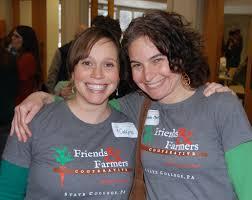Make Co-op Grocery Store a Reality in State College

Food shoppers in almost every university town, nearly all big cities, and towns smaller than ours can shop at a member-owned, full-service grocery store. Cornell, Madison, Urbana, East Lansing, South Bend — even the home of James Madison University in Harrisonburg, Va., (population less than 52,000) — all have thriving food co-ops.
Why not Centre County? It’s an ideal location with a community-minded population concerned about the origins and quality of its food, and witnessing an increasing demand for local food at farmers markets, restaurants and shopping carts. It is home to a major land-grant university, and students, staff and faculty at other land-grant institutions support their food co-ops with enthusiasm and dedication. We have the additional advantage of being located in what can only be called an agricultural paradise featuring a number of excellent farmers who steward the land while providing high-quality, fresh produce from late March through the following February.
We are on our way to establishing a food co-op here. Friends & Farmers Cooperative will hold its 2016 Membership Meeting & Election on Nov. 5 from 4-6:30 p.m. at the State College Friends School, 1900 University Drive. The membership meeting is open to members and anyone in the community who is interested in joining the co-op. In addition to an election for the democratically elected board (only members can vote), the meeting will feature an update on the co-op, a barter fair, music by acoustic duo Anchor&Arrow, soup featuring ingredients from the Friends & Farmers Online Market and made by Webster’s Bookstore Cafe, kid’s activities and more.
How do we know a food co-op is feasible here? Friends & Farmers recently received a $10,000 matching grant used in part to purchase the services of CDS Consulting, a cooperative of consultants supporting independent member-driven co-ops. The key result of its marketing study, which confirmed an earlier study,reported that “Based on the population size, demographic composition, and competitive environment of the State College market area, combined with the experiences of other natural foods co-ops in similar market situations, it appears that there is sufficient sales potential to support a full-line natural foods co-op.” It recommended a 10,000-square-foot store with 6,250 square feet of retail space.
Friends & Farmers began its membership campaign in March 2014, and currently comprises 475 household members. Food Co-op Initiative, the premier consulting firm for startup food co-ops in the U.S., tells us that our membership number is excellent for co-ops at our stage of development.
An important step toward a mission of “providing members and non-members with access to fairly priced, nutritious food and programs that support healthy food choices” is the planned opening of a full-service, one-stop, seven-days-a-week store offering as much of its products as possible from local producers. Friends & Farmers already operates an online market offering products from 35 local farmers and producers. Since its inception, the market has put approximately $150,000 into the pockets of local farmers and producers. It’s building strong relationships with the local producers who will supply the store, with the goal of opening with an established, foundational customer base. Next steps include growing membership, activating a site-selection committee and exploring financial backing.
We invite everyone interested in making a locally focused, food co-op store a reality here to attend the membership meeting. For more information about the co-op, the annual meeting, and how to join, go to www.friendsandfarmers.coop.
Opinion piece by James Eisenstein
James Eisenstein is professor emeritus of political science and public policy, serves on the board of Friends & Farmers Co-Op, and works as an unpaid fieldhand on a local organic farm.
Read more here







